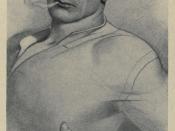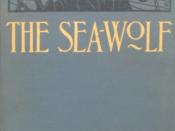Books: Jack London's Call of the Wild and The Sea-Wolf Courageous, untroubled, mocking and violent-that is what Wisdom wants us to be. Wisdom is a woman, and loves only a warriorâ (Friedrich Nietzsche). Wisdom and philosophy are undeniably dear to almost all writers. To London, this quote is all too true, where as wisdom and warriors are his prime writing topics. In Londonâ s books, instinct is a crucial commodity to every being. Without innate abilities, one is sure to suffer quick death. Contemporary civilization can mar the natural capacity for primordial feelings, and it is clear in Londonâ s works that anything great and strong cannot last within the confinements of modern society. It is in the realms of nature that one can become magnificent, and show their true, primitive selves. In Jack Londonâ s The Sea-Wolf and The Call of the Wild, the point of Londonâ s admiration for everything uncivilized is prominent throughout his novels.
London was in love with the â Wolf,â and everything it represents. His books leave an impression that anything primitive and innate is better off than that of anything modern; his characters are strong, masculine and recurrent to the point of pleasant prediction. Atavism thrives in the stories of Jack London. In Chapter III, Buckâ s primordial characteristics start evolving and soon become his prime subsistence. In her criticism, Mary Allen quotes Jack Londonâ s theory in writing his dog-heroes: â â He did not think these things; he merely did them.â And I [wrote] this repeatedly...in order to hammer into the average human that these dog-heroes of mine were not directed by abstract reasoning, but by instinct, sensation, and emotion, and by simple reasoningâ (Allen 274). Buck matured from a pampered pet into an archaic beast almost as soon as he...


